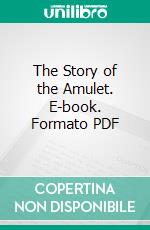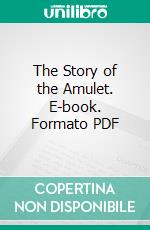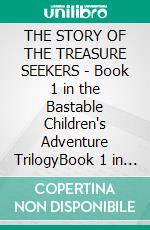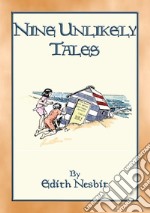The Story of the Amulet. E-book. Formato Mobipocket - 9788832528893
di E. Nesbit
edito da IONLINESHOPPING.COM , 2019
Formato: Mobipocket - Protezione: nessuna
The Story of the Amulet is a novel for children, written in 1906 by English author Edith Nesbit.
It is the final part of a trilogy of novels that also includes Five Children and It (1902) and The Phoenix and the Carpet (1904). In it the children re-encounter the Psammead—the "it" in Five Children and It. As it no longer grants wishes to the children, however, its capacity is mainly advisory in relation to the children's other discovery, the Amulet, thus following a formula successfully established in The Phoenix and the Carpet.
Gore Vidal writes, "It is a time machine story, only the device is not a machine but an Egyptian amulet whose other half is lost in the past. By saying certain powerful words, the amulet becomes a gate through which the children are able to visit the past or future. ... a story of considerable beauty."[1]
At the beginning of this book, the journalist father of Robert, Anthea, Cyril, and Jane has gone overseas to cover the war in Manchuria. Their mother has gone to Madeira to recuperate from an illness, taking with her their younger brother, the Lamb. The children are living with an old Nurse (Mrs Green) who has set up a boarding house in central London. Her only other boarder is a scholarly Egyptologist who has filled his bedsit with ancient artefacts. During the course of the book, the children get to know the "poor learned gentleman" and befriend him and call him Jimmy.
Nurse's house is in Fitzrovia, the district of London near the British Museum, which Nesbit accurately conveys as having bookstalls and shops filled with unusual merchandise. In one of these shops the children find the Psammead. It had been captured by a trapper, who failed to recognise it as a magical being. The terrified creature cannot escape, for it can only grant wishes to others, not to itself. Using a ruse, the children persuade the shopkeeper to sell them the "mangy old monkey", and they free their old friend.
Guided by the Psammead, the children purchase an ancient amulet in the shape of an Egyptian Tyet (a small amulet of very similar shape to the picture can be seen in the British Museum today) which should be able to grant them their hearts' desire: the safe return of their parents and baby brother. But this amulet is only half of an original whole. By itself, it cannot grant their hearts' desire. Yet it can serve as a portal, enabling time travel to find the other half.
Read the complete novel for further story....
It is the final part of a trilogy of novels that also includes Five Children and It (1902) and The Phoenix and the Carpet (1904). In it the children re-encounter the Psammead—the "it" in Five Children and It. As it no longer grants wishes to the children, however, its capacity is mainly advisory in relation to the children's other discovery, the Amulet, thus following a formula successfully established in The Phoenix and the Carpet.
Gore Vidal writes, "It is a time machine story, only the device is not a machine but an Egyptian amulet whose other half is lost in the past. By saying certain powerful words, the amulet becomes a gate through which the children are able to visit the past or future. ... a story of considerable beauty."[1]
At the beginning of this book, the journalist father of Robert, Anthea, Cyril, and Jane has gone overseas to cover the war in Manchuria. Their mother has gone to Madeira to recuperate from an illness, taking with her their younger brother, the Lamb. The children are living with an old Nurse (Mrs Green) who has set up a boarding house in central London. Her only other boarder is a scholarly Egyptologist who has filled his bedsit with ancient artefacts. During the course of the book, the children get to know the "poor learned gentleman" and befriend him and call him Jimmy.
Nurse's house is in Fitzrovia, the district of London near the British Museum, which Nesbit accurately conveys as having bookstalls and shops filled with unusual merchandise. In one of these shops the children find the Psammead. It had been captured by a trapper, who failed to recognise it as a magical being. The terrified creature cannot escape, for it can only grant wishes to others, not to itself. Using a ruse, the children persuade the shopkeeper to sell them the "mangy old monkey", and they free their old friend.
Guided by the Psammead, the children purchase an ancient amulet in the shape of an Egyptian Tyet (a small amulet of very similar shape to the picture can be seen in the British Museum today) which should be able to grant them their hearts' desire: the safe return of their parents and baby brother. But this amulet is only half of an original whole. By itself, it cannot grant their hearts' desire. Yet it can serve as a portal, enabling time travel to find the other half.
Read the complete novel for further story....
Ean
9788832528893
Titolo
The Story of the Amulet. E-book. Formato Mobipocket
Autore
Editore
Data Pubblicazione
2019
Formato
Mobipocket
Protezione
nessuna
Punti Accumulabili







